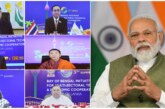The curtain was down on spectacular political drama in the Indian Parliament on 22 July 2008 when the government headed by Dr. Manmohan Singh won a perilously close vote of confidence, amid uproarious scenes. The win could mean India now focusing on pushing through a much-vaunted, long-delayed nuclear deal with the United States, and continue the pace of economic reforms. Had the UPA government lost the vote, the world’s biggest democracy would have faced early elections and the Indo-US nuclear deal would have remained in limbo.
The trust vote, following a two-day parliamentary debate, saw Prime Minister Manmohan Singh’s Congress party-led coalition, the United Progressive Alliance (UPA) securing 275 votes in its favor and 256 against in the confidence motion. Speaking to media persons outside parliament on 22 July, Prime Minister said: “Parliament has spoken in an unambiguous manner. This augurs well for the country’s development and for India’s efforts to find its rightful place in the comity of nations. It is a convincing victory.”
The vote of confidence, India’s first in a decade, was prompted when the government’s communist allies withdrew their support over the civilian nuclear deal, arguing that the pact made India a pawn of Washington. Their withdrawal left the government without a clear majority.
India seemed to be on the verge of mid-term elections after the CPI (M), one of the larger members of the coalition, announced its withdrawal of support in early July. The no-confidence vote was the culmination of vicious and pointed attacks by the Left parties aimed at the Congress-led coalition, the most pointed of which was the attack on the nuclear deal with the United States. The Left Parties used the nuclear deal as an excuse to attack the ruling coalition, calling the deal a ‘sell out’.
The Congress-led coalition survived thanks to support from Samajwadi Party, which with its 34 MPs, tipped the scales in favour of the Congress to survive the no-confidence motion. The tie-up between the Samajwadi Party and the Congress-led alliance appeared to have been stitched together at the last minute to avoid mid-term elections and allow the ruling party to continue to work.
When the Congress-led coalition government came to power four years ago, it promised to open the economy in sectors such as insurance, banking and retail. But communist allies stalled those plans. But since left parties parted ways with the government, hopes have risen that the country’s economic reform agenda will get a new lease on life. The post-trust vote government has already promised to carry forward the reform process.
Economists say the government could revive plans to sell part of its equity in public sector companies to shore up its finances. The foreign investment in the insurance sector is likely to be raised from 26 percent at present to 49 percent. However more controversial reforms are expected to remain on the backburner.
Economist D.H. Pai Panindiker, of the New Delhi-based the RPG Goenka Foundation, says the government is unlikely to concede to a long-standing demand of industry to change India’s archaic labour laws: “They will definitely stay away from labor reform, which can create a lot of uncertainty or some kind of apprehension among some sections of society. For example if you make labour a contract, it may create some dissatisfaction in the working class.”
The likelihood of opening up the retail sector to large foreign chains such as Walmart by the UPA government in the immediate near future also seems remote. So far only foreign retailers selling single brands such as Nike are allowed in the country. There is widespread opposition to large retail chains from owners of millions of native smaller stores, who apprehend that these chains will threaten their livelihood. Political analysts say the government, which is already grappling with high inflation, is no mood to do anything that might alienate voters when general elections are less than a year away. Nevertheless, Indian industry is optimistic that the economy will get fresh momentum at a time when many fear that the high growth witnessed in recent years might be tapering off.
Viewed in a broad spectrum, the real impact of recent trust vote will be felt in the coming months, as major and minor parties in India’s deeply fractured political system prepare for the next national elections, which must be held by May. The confidence vote has significantly rearranged old political alliances, sharpened the divide between political adversaries and threatened to intensify public cynicism toward elected leaders. As one analyst has put it: “The polite veils that are thrown over the workings of democracy have been lifted. Politics is going to get really, really ugly.”
The two-day debate in Parliament was at its peak on late 22 July afternoon, when three MPs with the opposition B.J.P., accused Congress’s new allies, along with Samajwadi Party, of offering them roughly 30 million rupees each in exchange for abstaining from the confidence vote. The allegation was made barely two hours before the scheduled vote. B.J.P. lawmakers stormed the well of Parliament, waving wads of cash and forcing Parliament to adjourn. B.J.P. leaders soon appeared before television cameras to detail the bribery allegations, and Samajwadi leaders went on air to deny the accusations and accuse senior B.J.P. leaders of bribery attempts.
It is just that with all this murky water flowing under the bridge, one does regret the fact that for sheer crudeness, opportunism, vulgarity, rejection of all civil norms of governance and absolutely no-holds barred attitude, Indian polity has no parallel. To think that starting from the likes of Gandhi, Jawaharlal Nehru, Sardar Patel, Rajendra Prasad, Madan Mohan Malviya, Lajpat Rai, K Kamaraj, Rajagopalachari, Ambedkar and others of the same galaxy we have reached where we have, one genuinely wonders what will be the state of Indian polity in the next 6 decades — not a very long time in the age of a nation.
At this critical juncture, when the distinction between political allies, opposition, blackmailers and posture-mongers, and in some cases even crooks, is rapidly beginning to blur, politics has been reduced to nothing beyond the votes of illiterate masses for the next election by hook and more often by crook.
For some, perhaps, the nuclear deal is an act of faith. However, there are few nuclear experts or experts at understanding complex international treaties. One could either believe, when a world class economist like Dr Manmohan Singh or a world class missile scientist like Abdul Kalam tells the nation that the deal is good for the country, or that it is not good. One wonders whether at any stage there was any genuine issue at all for the country to be dragged through all this sorry mess. It has been a sorry plight to see our politicians of the left and right wing alike ranting and raving and making a sordid spectacle of the country and its PM in world fora over the nuclear deal.
When the left withdrew support from the ruling coalition, well they made a call. The matter went to the highest “court” namely to the Lower House of Parliament. Now that the government has survived the trust vote, it is high time at least conduct the rest of the proceedings with such shreds of dignity as one can mop up. Frankly it is hard to imagine who is really surprised that money might have played a role in winning some votes. Now for the pot to call the kettle black and wash all the dirty soot on the linen in front of the international media hardly becomes the image of a nation aspiring for a seat on the Security Council.
Flurry of hectic activities could be seen in the political circles even few days prior to the voting day, and the vote had looked too close to call. Governing and opposition party leaders had gone all out to secure the votes of smaller parties and independents. And while the government had been forced to seek the vote after losing the support of its left-wing allies who opposed the nuclear deal, they also had to contend with an equally combative opposition.
Sensing that the government was vulnerable, the main opposition Bharatiya Janata Party (BJP) pulled out all the stops. The government, it said repeatedly, was panicking and using every means, fair and foul, to secure a victory. But the surprise came from a powerful regional politician who emerged as a rallying point for many of the smaller parties – Mayawati, chief minister of Uttar Pradesh, India’s most politically influential state. With the support of left-wing and other regional parties, she began persuading some members of the governing coalition to vote against it.
It was a tactic that almost worked. And it also pitched her on to the centre-stage of Indian politics. Already she is being talked of as a potential candidate for prime minister after the next elections. In effect, the confidence vote debate has set the scene for those polls.
While the nuclear deal was the central issue on the floor of parliament’s lower house, it was fairly evident that most parties used the opportunity to kick off their campaign.
Many members believe that it is economic issues such as rising prices which voters will be most concerned about rather than the nuclear question. And so over the past week, political parties have been jockeying to be in prime position when the elections are eventually held. New alliances have been forged; old enemies have become new friends.
But if there is one thing that has dismayed most Indians over the past few days, it is the sight of their political leaders openly squabbling in parliament. Even by Indian standards this was an unruly, ugly debate that often threatened to get out of hand.
The UPA government can expect no offsetting electoral joy from the nuclear deal. Indian voters, mostly poor and rural, are not fussed about foreign policy. Nor are many impressed by economic reforms, needed though they are. Manmohan Singh is a respected former finance minister. His government was expected to be much more reformist than its Communist comrades have in fact allowed it to be. Allied to the more flexible SP, it may now attempt a few modest measures: to allow more foreign direct investment in insurance, for example, and to try privatizing a public company or two.
But as the election looms, the Congress party and its allies are likely to devote more thought to winning it. In fact, that partly explains the government’s tie-up with the SP. Based in UP, and notorious for the corrupt governments it has led there, the SP is alleged to have demanded that the government pursue corruption allegations against its main rival, Mayawati, the state’s chief minister. A champion of dalits, her Bahujan Samaj Party trounced the SP in last year’s state election in UP, and threatens to do so in the general election. The SP is also seeking a favourable electoral alliance with Congress in UP. Congress can probably live with both demands. Indeed, a lacklustre police investigation into the source of Mayawati’s impressive wealth has already been revived. And an alliance with the SP in India’s most populous state, UP, could improve Congress’s own fortunes there.
Through such ad hoc alliances, in all 29 states of India, the BJP and Congress will build their campaigns. Indeed, their choice of allies, from among a growing multitude of regional and caste-based parties, is likely to have a bigger impact on their chances than any national issue. On recent form, both the main parties may emerge weaker from the election, and their allies stronger. Without surer leadership than either Congress or the BJP has recently displayed, their governments will become even weaker. This is a serious concern. But it is hardly surprising. All politics is local; and India has an awful lot of localities.
The post-trust vote scenario has culminated in three power configurations that will vie for their share of election pie once polls are held for the next Lok Sabha. The present dispensation in power at New Delhi is led by the Congress and other constituents of the UPA. Presently Congress is a divided house and is haunted by the leadership crisis, particularly at the state level. The days of ‘imposing leaders on the states from the High Command are over. Such a mechanism is detested by the state leaders as well. Only leaders of the stature of Nehru or Indira Gandhi could dare take such steps and this strategy virtually weakened the party instead of strengthening it.
With the regional parties gaining salience, the electoral exercise has become tough for the national parties, particularly when they try to dictate terms from New Delhi. As the situation obtains today, no national party can boast of forming a government of its own at the Centre. Be it either the Congress or the BJP, each is dependent on its regional allies for political survival and work according to the diktat of the regional allies.
The NDA led by the BJP needs reinvigoration, particularly in the aftermath of recent trust vote. The BJP is also afflicted by the internal bickering and disillusioned leaders have no concrete agenda to offer. Its old cards of Hindutava or minorities have been overplayed and lost the confidence of the masses. It opposes the Congress just for the sake of opposition and lacks any concrete alternative programme. He Congress syndrome also haunts the BJP at the Centre as well as in the states.
The BSP and Left parties combine holds some promise, provided this arrangement is arrived at with clear understanding and neither of the partners stabs the other in the back on appropriate occasion. The BSP has gained sizeable strength in recent years and its presence is felt in some major states. The party has started making dent into the strongholds the Congress as well as that the BJP. The BSP leader, Mayawati has been the rallying point for the Left and other regional satraps who are disenchanted with Congress and the BJP.
The Left parties’ efforts at forging a Third Front have been in the offing since 1980s and V.P. Singh’s Janta Dal was perhaps a step in that direction when it formed government at the Centre with the support of BJP and the Left parties. However, BJP ditched and the efforts for the Third Front also ended in fiasco. Now BSP under the leadership of Mayawati holds the promise. It seems to be a tough terrain and the BSP leader has to tread the path cautiously.
The nation has to pay a heavy price for political instability caused mainly by the inability of political parties to provide efficient and good governance. Price rise, inflation, law and order situation, growing menace of terrorism etc. have been the bane of political inefficiency for which the common man is paying with his blood and perspiration. The ongoing process of globalization in terms of free market economy, deregulation and privatization and foreign direct investment has been beneficial to handful of people and the gap between the rich and the poor has been further widened.
At a time when India is to emerge economic superpower by 2025, such developments seem retarding. It is also seeking permanent membership of the UN Security Council. With unruly scenes as witnessed recently in the Lok Sabha, can we as a nation, clamour for such coveted posts or stake our claim for being a superpower. Some forces seem to be working against nation’s interest and the people have to be vigilant against such vicious elements and it is our unity and eternal vigilance that can subdue such forces and take the nation on its chosen path.
By Dr. Arvind Kumar



